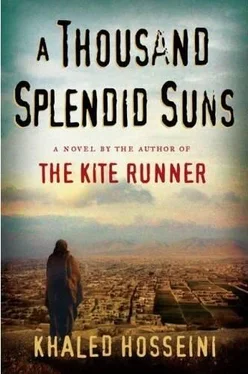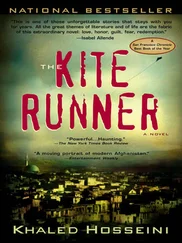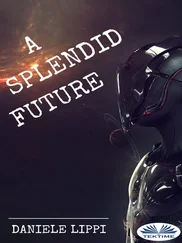Mammy hoisted a photo of Ahmad and Noor high over her head. It was the one of them sitting back-to-back under the pear tree. There were others like her, women with pictures of their shaheed husbands, sons, brothers held high.
Someone tapped Laila and Hasina on the shoulder. It was Tariq.
"Where did you get that thing?" Hasina exclaimed.
"I thought I'd come dressed for the occasion." Tariq said. He was wearing an enormous Russian fur hat, complete with earflaps, which he had pulled down.
"How do I look?"
"Ridiculous," Laila laughed.
"That's the idea."
"Your parents came here with you dressed like this?"
"They're home, actually," he said.
The previous fall, Tariq's uncle in Ghazni had died of a heart attack, and, a few weeks later, Tariq's father had suffered a heart attack of his own, leaving him frail and tired, prone to anxiety and bouts of depression that overtook him for weeks at a time. Laila was glad to see Tariq like this, like his old self again. For weeks after his father's illness, Laila had watched him moping around, heavy-faced and sullen.
The three of them stole away while Mammy and Babi stood watching the Soviets. From a street vendor, Tariq bought them each a plate of boiled beans topped with thick cilantro chutney. They ate beneath the awning of a closed rug shop, then Hasina went to find her family.
On the bus ride home, Tariq and Laila sat behind her parents. Mammy was by the window, staring out, clutching the picture against her chest. Beside her, Babi was impassively listening to a man who was arguing that the Soviets might be leaving but that they would send weapons to Najibullah in Kabul.
"He's their puppet. They'll keep the war going through him, you can bet on that."
Someone in the next aisle voiced his agreement.
Mammy was muttering to herself, long-winded prayers that rolled on and on until she had no breath left and had to eke out the last few words in a tiny, high-pitched squeak.
THEY WENT TO Cinema Park later that day, Laila and Tariq, and had to settle for a Soviet film that was dubbed, to unintentionally comic effect, in Farsi. There was a merchant ship, and a first mate in love with the captain's daughter. Her name was Alyona. Then came a fierce storm, lightning, rain, the heaving sea tossing the ship. One of the frantic sailors yelled something. An absurdly calm Afghan voice translated: "My dear sir, would you kindly pass the rope?"
At this, Tariq burst out cackling. And, soon, they both were in the grips of a hopeless attack of laughter. Just when one became fatigued, the other would snort, and off they would go on another round. A man sitting two rows up turned around and shushed them.
There was a wedding scene near the end. The captain had relented and let Alyona marry the first mate. The newlyweds were smiling at each other. Everyone was drinking vodka.
"I'm never getting married," Tariq whispered.
"Me neither," said Laila, but not before a moment of nervous hesitation. She worried that her voice had betrayed her disappointment at what he had said. Her heart galloping, she added, more forcefully this time, "Never."
"Weddings are stupid."
"All the fuss."
"All the money spent."
"For what?"
"For clothes you'll never wear again."
"Ha!"
"If I ever do get married," Tariq said, "they'll have to make room for three on the wedding stage. Me, the bride, and the guy holding the gun to my head."
The man in the front row gave them another admonishing look.
On the screen, Alyona and her new husband locked lips.
Watching the kiss, Laila felt strangely conspicuous all at once. She became intensely aware of her heart thumping, of the blood thudding in her ears, of the shape of Tariq beside her, tightening up, becoming still. The kiss dragged on. It seemed of utmost urgency to Laila, suddenly, that she not stir or make a noise. She sensed that Tariq was observing her – one eye on the kiss, the other on her – as she was observing him. Was he listening to the air whooshing in and out of her nose, she wondered, waiting for a subtle faltering, a revealing irregularity, that would betray her thoughts?
And what would it be like to kiss him, to feel the fuzzy hair above his lip tickling her own lips?
Then Tariq shifted uncomfortably in his seat. In a strained voice, he said, "Did you know that if you fling snot in Siberia, it's a green icicle before it hits the ground?"
They both laughed, but briefly, nervously, this time. And when the film ended and they stepped outside, Laila was relieved to see that the sky had dimmed, that she wouldn't have to meet Tariq's eyes in the bright daylight.
April 1992
Three years passed.
In that time, Tariq's father had a series of strokes. They left him with a clumsy left hand and a slight slur to his speech. When he was agitated, which happened frequently, the slurring got worse.
Tariq outgrew his leg again and was issued a new leg by the Red Cross, though he had to wait six months for it.
As Hasina had feared, her family took her to Lahore, where she was made to marry the cousin who owned the auto shop. The morning that they took her, Laila and Giti went to Hasina's house to say good-bye. Hasina told them that the cousin, her husband-to-be, had already started the process to move them to Germany, where his brothers lived. Within the year, she thought, they would be in Frankfurt. They cried then in a three-way embrace. Giti was inconsolable. The last time Laila ever saw Hasina, she was being helped by her father into the crowded backseat of a taxi.
The Soviet Union crumbled with astonishing swiftness. Every few weeks, it seemed to Laila, Babi was coming home with news of the latest republic to declare independence. Lithuania. Estonia. Ukraine. The Soviet flag was lowered over the Kremlin. The Republic of Russia was born.
In Kabul, Najibullah changed tactics and tried to portray himself as a devout Muslim. "Too little and far too late," said Babi. "You can't be the chief of KHAD one day and the next day pray in a mosque with people whose relatives you tortured and killed." Feeling the noose tightening around Kabul, Najibullah tried to reach a settlement with the Mujahideen but the Mujahideen balked.
From her bed, Mammy said, "Good for them." She kept her vigils for the Mujahideen and waited for her parade. Waited for her sons' enemies to fall.
AND, EVENTUALLY, they did. In April 1992, the year Laila turned fourteen.
Najibullah surrendered at last and was given sanctuary in the UN compound near Darulaman Palace, south of the city.
The jihad was over. The various communist regimes that had held power since the night Laila was born were all defeated. Mammy's heroes, Ahmad's and Noor's brothers-in-war, had won. And now, after more than a decade of sacrificing everything, of leaving behind their families to live in mountains and fight for Afghanistan 's sovereignty, the Mujahideen were coming to Kabul, in flesh, blood, and battle-weary bone.
Mammy knew all of their names.
There was Dostum, the flamboyant Uzbek commander, leader of the Junbish-i-Milli faction, who had a reputation for shifting allegiances. The intense, surly Gulbuddin Hekmatyar, leader of the Hezb-e-Islami faction, a Pashtun who had studied engineering and once killed a Maoist student. Rabbani, Tajik leader of the Jamiat-e-Islami faction, who had taught Islam at Kabul University in the days of the monarchy. Sayyaf, a Pashtun from Paghman with Arab connections, a stout Muslim and leader of the Ittehad-i-Islami faction. Abdul Ali Mazari, leader of the Hizb-e-Wahdat faction, known as Baba Mazari among his fellow Hazaras, with strong Shi'a ties to Iran.
And, of course, there was Mammy's hero, Rabbani's ally, the brooding, charismatic Tajik commander Ahmad Shah Massoud, the Lion of Panjshir. Mammy had nailed up a poster of him in her room. Massoud's handsome, thoughtful face, eyebrow cocked and trademark pakol tilted, would become ubiquitous in Kabul. His soulful black eyes would gaze back from billboards, walls, storefront windows, from little flags mounted on the antennas of taxicabs.
Читать дальше












